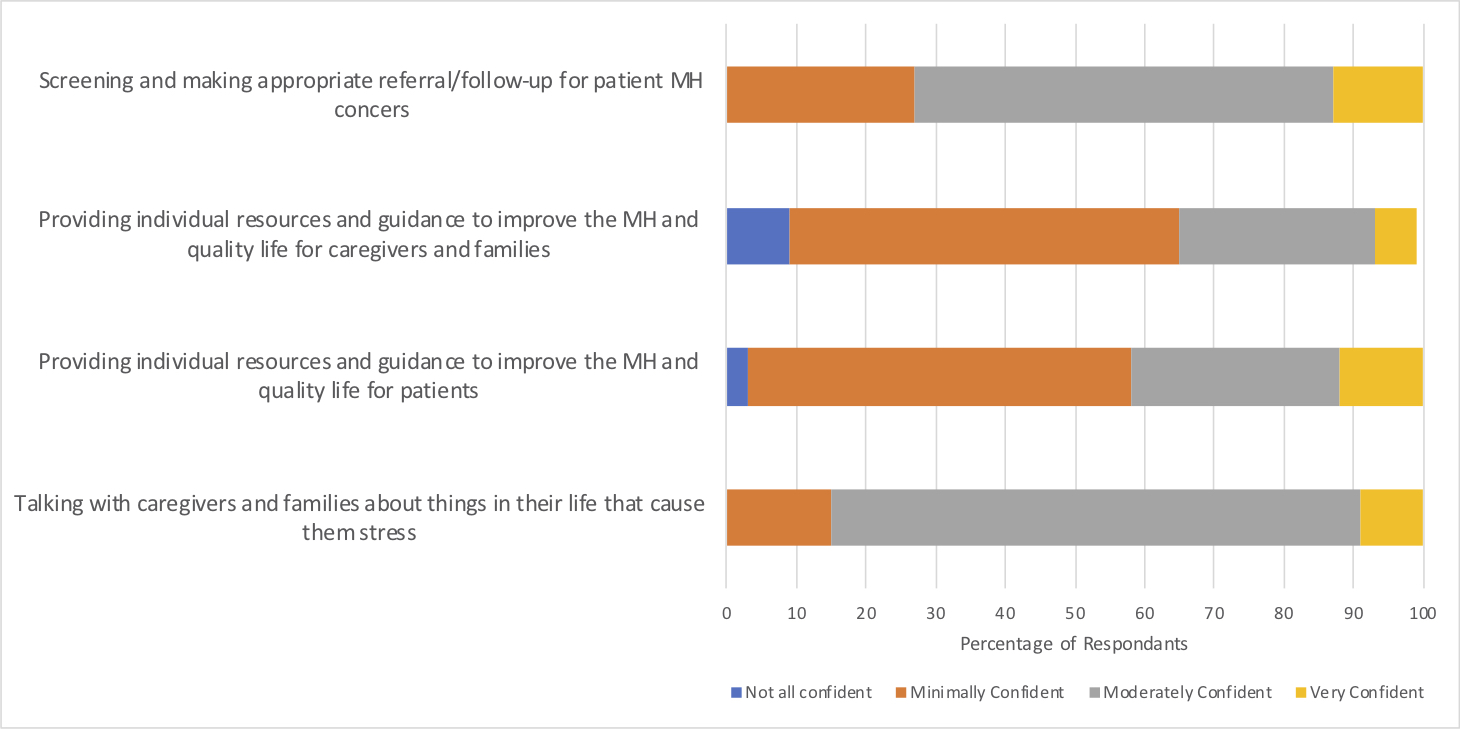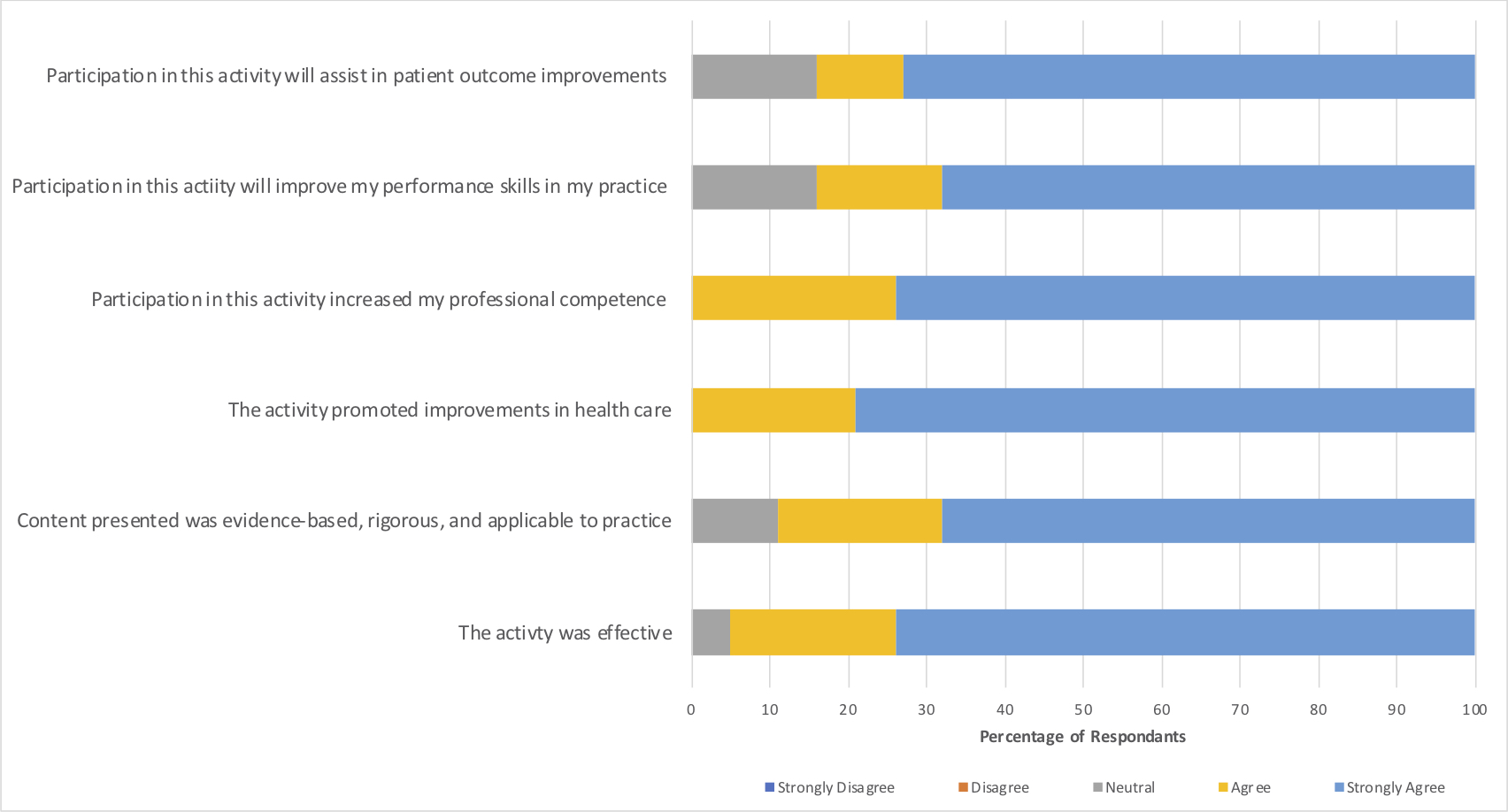Session Information
Session Type: Poster Session A
Session Time: 6:00PM-7:00PM
Background/Purpose: Mental health (MH) problems, particularly anxiety and depression, are common in children and adolescents with pediatric rheumatologic diseases, and impact disease-related outcomes. Pediatric rheumatology providers often lack training to effectively address these problems. As part of a quality improvement project, we developed a workshop series to equip pediatric rheumatology providers with MH assessment skills and management strategies. We measured participant-reported perceived impact of the workshops on future MH practices.
Methods: Two 2-hour, Continuing Medical Education (CME)-certified virtual workshops were delivered in October 2022. Speakers included 3 pediatric rheumatologists, 2 social workers, 1 parent, 2 psychologists, and 1 art therapist/licensed mental health counselor. The learning objectives were to: 1) recognize the impact of MH for pediatric rheumatology patients, 2) identify early signs/symptoms of anxiety and depression, 3) perform routine screening for anxiety and depression, suicide risk assessment, and safety planning, and 4) understand the role of different MH interventions (e.g., coping strategies, cognitive behavioral therapy, art/play therapy). Each workshop had a 30-minute breakout discussion of participants MH care experience, barriers and facilitators. Participants completed pre- and post-activity surveys using Likert scales to indicate their level of confidence in MH care, and perceived impact of the workshops. Participant demographics were summarized using descriptive statistics, and Likert responses were tabulated.
Results: Eighty participants registered for both workshops from across the world (Canada, Colombia, Italy, Mexico, Spain, United Kingdom, and United States) including 46 physicians (57.5%), 7 nurse practitioners (8.8%), 6 nurses (7.5%), 5 social workers (6.3%), 3 psychologists (3.8%), and 13 others (with roles as physical therapists, physician assistants and administration). Forty-eight percent (n=38) of registered participants attended both workshops. Pre-activity surveys indicated that 97.3% (n=37) of attendees agreed it is important to routinely screen patients for depression and anxiety in rheumatology clinic. The most common cited barriers were limited time, MH resources and funds. While 76% felt at least moderately confident about talking with patients/families about MH, less than half felt at least minimally confident about providing MH resources/guidance (Figure 1). Post-activity surveys showed that 90% and 85% felt that the workshops were effective and increased their competence level, respectively (Figure 2). Anticipated changes in practice included better implementation of MH screening, suicide risk assessment and safety planning.
Conclusion: This data supports the feasibility of a multidisciplinary MH educational workshop series for equipping pediatric rheumatology providers with knowledge and skills to screen and manage MH problems. Further refinement and dissemination of provider educational workshops may improve MH outcomes for youth with pediatric rheumatology diseases.
 Figure 1: Pre-activity survey for participant-reported level of confidence in MH care, n=38
Figure 1: Pre-activity survey for participant-reported level of confidence in MH care, n=38
 Figure 2: Post-activity survey for participant-reported feedback on workshop series, n=19
Figure 2: Post-activity survey for participant-reported feedback on workshop series, n=19
To cite this abstract in AMA style:
El Tal T, Ardalan K, Cunningham N, Curran M, Dela Paz M, Edison S, Itczak M, Kim S, Goldstein-Leever A, Lorber S, Knight A. The Mosaic of Mental Health: Perceived Impact of a Workshop Empowering Pediatric Rheumatology Clinicians in Routine Screening and Effective Management of Mental Health Problems [abstract]. Arthritis Rheumatol. 2023; 75 (suppl 4). https://acrabstracts.org/abstract/the-mosaic-of-mental-health-perceived-impact-of-a-workshop-empowering-pediatric-rheumatology-clinicians-in-routine-screening-and-effective-management-of-mental-health-problems/. Accessed .« Back to 2023 Pediatric Rheumatology Symposium
ACR Meeting Abstracts - https://acrabstracts.org/abstract/the-mosaic-of-mental-health-perceived-impact-of-a-workshop-empowering-pediatric-rheumatology-clinicians-in-routine-screening-and-effective-management-of-mental-health-problems/
